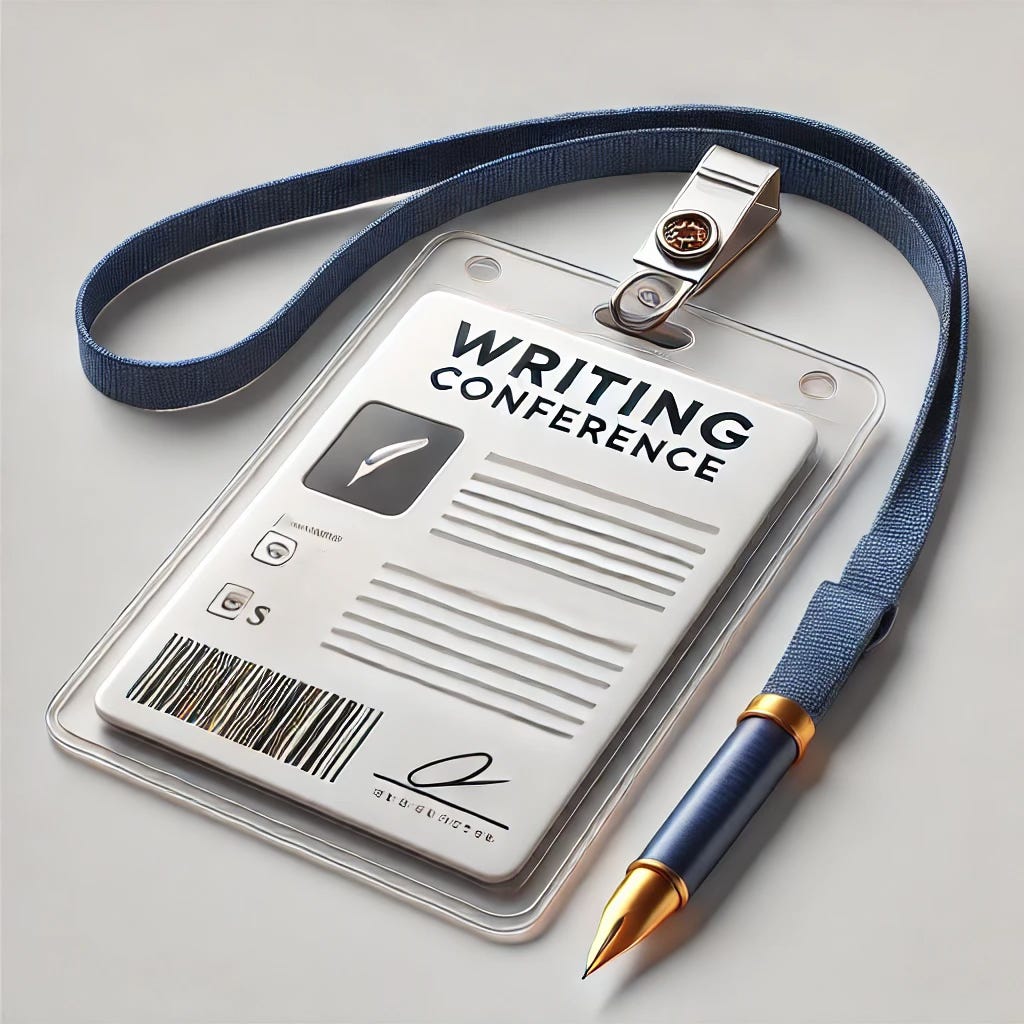Writing Conference Success: Strategies to Maximize Your Investment
In Person - Virtual & Alternatives
Many writers struggle with the decision of attending writer’s conferences. The opportunity to meet agents, attending panels, and soaking in the "magic" of the writing community is undeniable—but, conferences aren’t cheap. Between travel, registration fees, and overpriced airport coffee, a single weekend can set you back thousands of dollars.
So, are these events truly worth the investment? And if they are, how can you ensure you're spending your money—and your time—wisely?
To help, I’ve put together a list of the pros and cons of attending writing conferences, offered a few alternatives, and share tips to assist you in making the right choice for you.
What’s the Price Tag?
Attending a reputable, multi-day writing conference can cost anywhere from $500 to $3,000, depending on the venue, location, and prestige. Here’s a typical breakdown:
Registration fees: $250–$600 (higher for premium access) – some are per day
Travel and lodging: $200–$1,500 per night depending on distance and accommodations
Meals and extras: $50–$100 per day (some conferences include/offer a meal package)
Manuscript critique or agent meetings: $50–$200 per session.
That’s a significant investment for a long weekend, especially for a writer without an advance or steady income from book sales. Though there are some great opportunities at these events, before you commit, ask yourself: What are you really getting for your money?
Just a note on one-on-one critiques and pitches. I personally think these can be of immense value to the writer vs a speed pitch. When I do them, I make sure the writers get as much value for their investment as possible. I also let them know I’m available for questions following our meeting. I know what it’s like to forget an important question in the moment, and I want them to leave feeling supported.
Evaluate Your Goals Before You Commit
Not every conference is a match for your goals. Here’s how to decide if a particular event is worth attending:
Define your objectives. Are you looking to:
Find an agent?
Learn about the craft of writing?
Network with other authors?
Build industry knowledge?
Knowing your purpose will help you focus your search for the conferences that align with your priorities.
Research the lineup.
Are the speakers, panels, and agents relevant to your genre?
Look for reviews by attendees. Did writers like you find value?
Assess access.
Will you get meaningful face time with agents or editors?
Are there structured opportunities to make connections, or is it all free-for-all networking?
Consider alternatives. If the conference doesn’t align perfectly, could that same investment be better spent elsewhere?
Getting to pitch six or more agents is great, but did you make genuine connections with ones who work in your genre? The same goes for attending every possible workshop, some are free and some have a fee, but attending all the things doesn’t really help you either.
Quality beats quantity. Three solid workshops that address your specific needs are worth more than fifteen generic ones about "finding your voice" or "writing great characters."
Making Smart Choices
Before you click that registration button, ask yourself:
Does this conference align with your goals and needs?
If you write horror, a romance-focused conference isn't your best bet
If you're still drafting, craft-focused events will be more helpful than industry ones
If you're ready to query, agent-heavy conferences make sense
Are the presenters reputable and active/knowledgeable in your genre or craft need?
Check the speaker list and do a bit of research on them
Research the people teaching workshops or masterclasses
I’ve heard advice of “beware conference circuit regulars”. I’m not sure what the negative connotation is here. Repeat conference faculty usually have a wealth of knowledge and are asked back to these events because writers find value in what they teach.
What's the real agenda?
Some conferences exist to sell services
Others are genuine learning opportunities
The best ones offer both education and *networking opportunities.
* Most events will have networking opportunities like a cocktail party or similar that the agents and editors are required to attend. This is not to say you should jump on them and start pitching your book. Focus on genuine conversations that build rapport.
The Value of Virtual Events
Virtual conferences have become a cost-effective alternative, with distinct advantages and may require different strategies:
Virtual Pros:
Affordability: Registration fees are often half the cost of in-person events, and you avoid travel expenses and headaches.
Accessibility: You can attend from anywhere, eliminating geographic barriers.
Replay Value: Many virtual events offer recordings, so you can revisit sessions or catch what you missed.
Other Virtual Event Offerings:
Participate in chat discussions
Attend virtual networking rooms
Follow up with speakers and attendees on social media
Use the money you save on travel for manuscript critiques or mentorship
One virtual conference I recommend is WDW – Writing Day Workshop. They do in-person and virtual one-day events every month in various cities that are low-cost – around $200 plus add on for pitches, critiques etc.
I will be doing a few of these conferences this year, in person and online.
Virtual Cons:
Limited Networking: Building genuine connections is more difficult without in-person interaction – such as the cocktail parties/events noted above.
Zoom Fatigue: Virtual events can be less engaging, though they still provide excellent value.
Beyond Pitching: Strategies for Meaningful Networking
Pitching to an agent at a conference can be nerve-wracking—and, frankly, hit-or-miss. Instead of focusing solely on the pitch session, try these strategies for building lasting professional relationships:
Be curious and approachable. Introduce yourself to fellow writers, panelists, and speakers. Ask questions, show interest in their work, and follow up later.
Engage on social media. Connect with speakers and attendees online before and after the event. A thoughtful tweet or DM can help you stand out.
Volunteer. Many conferences offer discounted registration in exchange for helping out. It’s a great way to meet organizers and speakers on a personal level.
Host informal meetups. Organize a breakfast, happy hour, or online post-conference chat for writers in your genre. This can create more relaxed opportunities for connection.
Building Long-Term Relationships
Whether virtual or in-person, conferences are a great place to meet people that share your love of writing. So don’t let the end of the conference be the end of your professional networking.
Here’s how to keep the momentum going:
Follow up promptly. Send a quick, polite message referencing your conversation.
Create value. Share resources, recommend books, or promote others’ successes. Networking is about giving, not just taking.
Stay engaged. Join quality critique groups, attend local meetups, or participate in online writing forums to maintain relationships year-round.
Alternatives to Conferences
Workshops, Webinars and online courses: Many agents and editors host live, online Q&As or workshops, which can provide direct access without the travel.
Platforms like Manuscript Academy, Writers Digest or Reedsy also offer targeted classes.
Cost can be $0-$$$
Social media and newsletters: Build connections through active participation in online communities and subscribing to industry insiders.
Refer to my post Marketing For Introverts, where I talk about creating your own newsletter and engaging with communities.
Before you invest, be honest about where you are in your journey. A $1500 conference might be less valuable than:
A developmental edit of your manuscript
A series of craft workshops
Dedicated writing time
Making the Right Choice for You
Conferences can be valuable – but they're not magic, they're tools, and their value depends on how you use them. The best investment is the one that moves your writing goals forward.
Choose wisely, invest strategically, and remember – no conference is better than one that doesn't serve your needs.
Suggestions to maximize your investment:
Do your homework. Research speakers, plan your schedule, and know your questions.
Focus on relationships. Be open. Listen more than you talk, and follow up thoughtfully.
Take actionable notes. Write down techniques, recommendations, and contacts.
Have a follow-up plan. Implement what you’ve learned and maintain connections.
NEW TO GRYPHON QUILL? Check out more writing tips here including:
How to keep agents reading: The Science of Rejection
How to write strong scenes: Hook the Agent
How to not stress over comps: Fiction Comps are BS
How to write a strong query letter: Stand Out: A Query Intervention
NEW TO ME: You can find more about me here.
If you enjoy my posts, please share with others. I love meeting new people.
Thanks for reading Gryphon Quill! Get FREE writing tips, publishing and agent insight; and access to FREE live webinars w/ Q&A






Thank you Renee. This is very timely as I’m considering whether to attend the Surrey conference again. I also meant to ask you the other day about the value of one on one pitches with agents at conferences. Perhaps that could be a topic to explore in more details at some point?
This was super helpful, Renee! It looks like there is a conference in Charlotte in March so I’m definitely going to check it out and go through your checklists to see if it’s a fit 😊